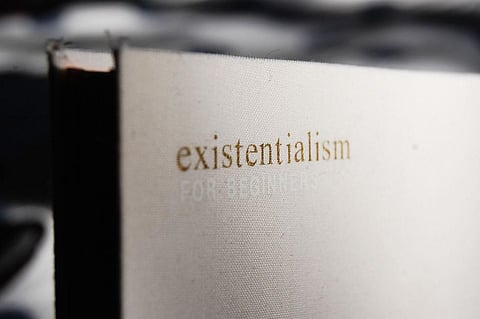
- Union Budget 2026
- Home
- NewsGram USA
- India
- न्यूजग्राम
- World
- Politics
- Entertainment
- Culture
- Lifestyle
- Economy
- Sports
- Sp. Coverage
- Misc.
- NewsGram Exclusive
- Jobs / Internships

By Atul Mishra
Can it be asserted that existentialism is an ancient philosophy, or is it really a modern concept? Is the essence of existentialism a western philosophical thought?
Albert Camus' words in The Myth of Sisyphus-"There is but one truly serious philosophical problem, and that is suicide" nails the existential disposition. The purpose of human existence comes down to this statement. Existential philosophers say that those who realize the absurdity of life in their ennui also realize the importance of 'individual' and freedom. And that's Camus' argument in its dregs- that life's absurdity and meaninglessness become all the more reason to accept it and live it fully, and that we must imagine Sisyphus happy.
When we think of existentialism, the names that come across our minds are Camus, Sartre, Nietzsche and Kierkegaard. Kierkegaard is considered the father of existentialism. According to Kierkegaard, angst and existential despair appears when an inherited or borrowed world-view (what modernists now call 'a collective conscious') proves unable to handle the unexpected and extreme life-experiences that are personal (personal conscious). Nietzsche extended this view to suggest that the so-called Death of God -the loss of collective faith in religion and traditional morality – created a more widespread existential crisis for the philosophically aware. Sartre's "Existence precedes Essence" theory defines the human nature and its localized and changing power, and that because existence precedes the being, an individual is bound to be free.
The existential philosophy can be surmised as- because life is absurd we must live it happily and do our duties, and that's what gives a man an over-reaching quality and freedom (Nietzsche's ubermensch, the over man). Existentialism has had many proponents in 19th and 20th centuries but on tracing the itinerary of Indian philosophy it's found that roots of existentialism can be found in many Indian classical texts and philosophers as well.
The concept of self and the epistemological position that an individual possesses, which philosophers like Kant,Husserl, Nietzsche and Camus talked of have been maintained profoundly in Indian Philosophies of Bhagvad Gita, Buddha and in the modern teachings of Radhakrishnan.
For instance, when Arjun went through a personal crisis before the battle, Krishna's words, etched with a fervor of existentialism came as a solution to his problems.
If The Myth of Sisyphus having drawn from Greek mythology can be seen as a solution to existential dilemma, then very similarly Andy Fraenkel's Mahabharata: The Eternal Quest is a perfect example showcasing how the magnum opus Hindu mythology is an eternal solution to existential crisis borne by a majority of us these days.
Speaking to the Elephant Journal he said-
"The dharma is the essence of all sacred teachings. When we understand the dharma we can live a life of wellness. We have lost sight of the dharma. Understanding the dharma is pivotal to what Mahabharata: The Eternal Quest is all about."
The teachings of Buddha and Krishna have analogies to Nietzsche's "ubermensch" theory. In Thus Spoke Zarathustra Nietzsche asks, "What is the greatest experience you can have? It is the hour of the great contempt. The hour when your happiness, too, arouses your disgust, and even your reason and your virtue." Shades and echoes of this philosophical ideology (while speaking of the transgressing power of an individual) is replicated in Buddha's life where he abandons everything and achieves the greatest experience that Zarathustra here is talking about. A stark analogy between Nietzsche and Buddha is that they both begin from a common notion about the nature of the world and the human condition.
These commonalities have to do with their epistemological views and their nihilistic attitudes toward metaphysical issues. A dialogue in the Sutta-Nipata presents the Buddha responding as follows to an enquiry on metaphysical theories- 'Apart from consciousness', he says, 'no divers truths exist. Mere sophistry declares this 'true' and that view 'false'.' A similar notion appears in Nietzsche's Will to Power:
'Judging is our oldest faith; it is our habit of believing this to be true or false, of asserting or denying, our certainty that something is thus and not otherwise, our belief that we really 'know' what is believed to be true in all judgments?'
Even the Advaita Vedanta of Shankaracharya defines so much about the ontology and epistemology of the existence of human beings. Sarvepalli Radhakrishnan reinterpreted Advaita Vedanta and found similarities in its theories with the thinking of existential philosophers. Both Radhakrishnan and the existentialists emphasize on the immense potentialities of an individual. Radhakrishnan maintains that man must be transformed and transmuted to a higher level of existence in course of evolution. Man's greatness is not in what, he is but in what he can be, is what Radhakrishnan says, exactly like the ideology of Jean Paul Sartre who proposes-"it-is-what-it-is-not and that it is not what-it-is." Man exists and makes himself develop into what he wants to be.
